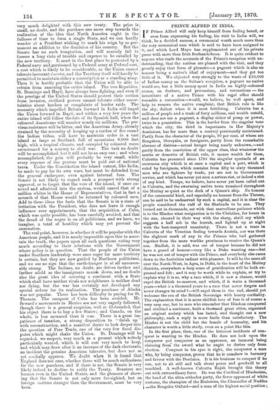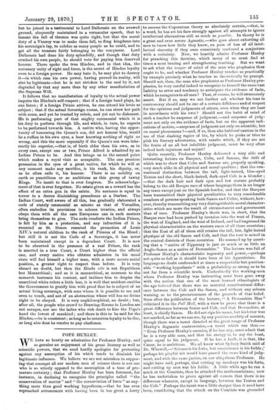PRINCE ALFRED IN INDIA.
I F Prince Alfred will only keep himself from feeling bored, or
even from expressing his feeling, his visit to India will, we think, be a decided success, a ceremonial worth much more than the very economical sum which is said to have been assigned to it, and which Lord Mayo has supplemented out of his private parse with more than Irish freehandedness. It is quite evident to anyone who reads the accennts of the Prince's reception with un- derstanding, that the natives are pleased with the visit, and they greatly enjoy that form of pleasure—a pageant which is also an honour being a native's ideal of enjoyment—and they get too little of it. We objected very strongly to the waste of /10,000 of Indian money ou the Sultan's reception, a pageant no native would see, but a little money spent in India on highly-coloured scenes, on durbars, and processions, and coronations — the investiture of a native Prince with his regal office should resemble a coronation—would, we believe, be well spent, and help to remove the native complaint, that British rule is like the sky, dullest when it is most fertilizing. Calcutta has a million of people and a trade of forty millions, and wealth untold, and does not see a pageant, a display either of pomp or power, twice in a generation. This is the harder from the singular tone which the city, the third in importance in Her Majesty's dominions, has for more than a century persistently maintained. Partly from the character of the people, 90 per cent. of whom are Bengalees, Ooreyahs, or foreigners, partly from the remarkable absence of distress—actual hunger being nearly unknown,—and partly from the conviction of the upper class, that whatever the merits or demerits of British rule, it means wealth for them, Calcutta has presented since 1790 the singular spectacle of an enormous city which is at once a capital and a port, which is ruled by foreigners, which contains from fifty to sixty thousand men who are fighters by trade, yet are not in Government service, and which has never yet seen a serious riot, or indeed a riot of any kind. Troops, we believe, have never yet been called out in Calcutta, and the swarming native town remained throughout the Mutiny as quiet as the deck of a Queen's ship. No honour of the ceremonial kind, and especially no honour from the Throne, can be said to be undeserved by such a capital, and it is clear the people considered the visit of the Shahzada to be one. They turned out in thousands, sat with that marvellous patience which is to the Hindoo what resignation is to the Christian, for hours in the sun, cheered in their way with the sharp, shrill cry which suggests a half sob in the hurrah, and lighted up at night with the best-tempered unanimity. There is not a trace in Calcutta of the Venetian feeling towards Austria, nor was there the slightest mark of any in the Princes who had gathered together from the more warlike provinces to receive the Queen's son. Siudiab, it is said, was out of temper because he did not have a guard of honour—very like a Duke wanting one—but he was not out of temper with the Prince, and everybody else came down to the festivities radiant with pleasure. It will be the same all over the North-West, in Agra, in Delhi, in the heart of the Mutiny districts, everywhere a deep sense of gratification will be both ex- pressed and felt ; and it may be worth while to explain, or try to explain why it is so, why a race which, if it saw a chance, would expel the British to-morrow, and which, if it waits a thousand years—what is a thousand years to a race that never forgets and never changes its mind 1—will expel them in the end, should yet welcome the son of the British Sovereign with hearty cordiality. The explanation that it is mere childish love of fuss is of course a very easy one, but to men who remember that Hindoos conquered and civilized a continent, built a thousand great cities, organized an original society which has lasted, and thought out a new philosophy, such a reply is more facile than satisfactory. The Hindoo is not the child but the female of humanity, and his character is worth a little study, even on a point like this.
In the first place, then, one of the bitterest incidents of con- quest is wanting to the Hindoo. He does not look upon the conqueror qua conqueror as an oppressor, an immoral being claiming from the sword what he ought to derive only from election. Conquest in his eyes is right, the conqueror a man who, by being conqueror, proves that he is somehow in harmony and favour with the Destinies. It is his business to conquer if he can, not to sit still and talk about peace and goodwill to all mankind. A well-known Calcutta Rajah brought this theory out with extraordinary force. He was the Cardinal of Hindooism, the head of the ultra-orthodox party, the fierce opponent of white customs, the champion of the Brahmins, the Chancellor of Nnddea —the Bengalee Oxford—and a man of the highest social position ;
but he joined in a testimonial to Lord Dalhousie on the avowed ground, eloquently maintained in a vernacular speech, that to lament the fall of thrones was quite right, but that the moral duty of a Viceroy was to make them fall, to fling kingdoms into his sovereign's lap, to subdue as many people as he could, and to get all the treasure fairly belonging to the conqueror. Lord Dalhousie had done his duty splendidly, and though that duty crushed his own people, he should vote for paying him deserved honour. There spoke the true Hindoo, and in that idea, the necessary unity of right and force, is the secret of Hindoo loyalty even to a foreign power. He may hate it, he may plot to destroy it—in which case his own power, having proved its reality, will also be legitimate—but he is not stricken to the soul by it, not degraded by that any more than by any other manifestation of the Supreme Will.
it follows that no manifestation of loyalty to the actual power impairs the Hindoo's self-respect ; that if a foreign band plays, he can listen ; if a foreign Prince arrives, he can attend his levee as subject ; that if the actual Sovereign comes, he can strew her path with roses, and yet be treated by rebels, and yet not be dishonest. He is performing part of that mighty ceremonial which it is his duty to perform through life, and which, in turn, he expects to be performed towards him. A native who, having the oppor- tunity of honouring the Queen's son, did not honour him, would be a ruffian in his own eyes, a boor knowing nothing of right or wrong, and this the more especially if the Queen's son were inhe- rently his superior,—that is, of birth older than his own, as in every case, except one or two, Prince Alfred is admitted by an Indian Prince to be. And this brings us to the second point which makes a royal visit so acceptable. The one precious possession in the eyes of a great native, for which he will at any moment make any sacrifice, is his rank, his dignity, or, as he often calls it, his honour. There is no nobility on earth so punctilious or so ambitious as this group of tawny Kings. No insult to that is ever forgiven. No acknowledge- ment of that is ever forgotten. No estate given as a reward has the effect of an extra gun in the salute. No sentence is equal in terror to a decree diminishing precedence at a Durbar. The Indian Court, well aware of all this, has gradually elaborated a code of stately ceremonial as minute as that of Versailles, often embodies its provisions in solemn treaties, and always obeys them with all the care Europeans can in such matters bring themselves to give. The code comforts the Indian Prince, is felt by him as a protection, and any infraction of it is resented as St. Simon resented the promotion of Louis XIV.'s natural children to the rank of Princes of the Blood ; but still it is not the Code of a Sovereign, it has never been maintained except in a dependent Court. It is now to be observed in the presence of a real Prince, the rank is asserted in a true Court, a Court higher than the official one, and every native who obtains admission in his usual state will feel himself a higher man, with a more secure social position, a greater right to respect than before. It is very absurd no doubt, but then the Hindo role is not Republican but Monarchical ; and as it is monarchical, as nearness to the monarch increases his content, and inclines him to despise the anarchical white rulers a little less, it is well that accident enables the Government to gratify him with proof that he is subject of an actual living sovereign, with sons whom it is possible to see and -even to touch, and not of an abstraction whose will has no divine right to be obeyed. It is very uuphilosophical, no doubt ; but, after all, the people who crowd to Drawing-Rooms in London are not savages, nor are the ladies who risk death to kiss the Pope's band the lowest of mankind ; and there is this to be said for the Hindoo,—he is consistent ; 811 long as he conceives loyalty to be due, scr long also does he resolve to pay obedience.



































 Previous page
Previous page